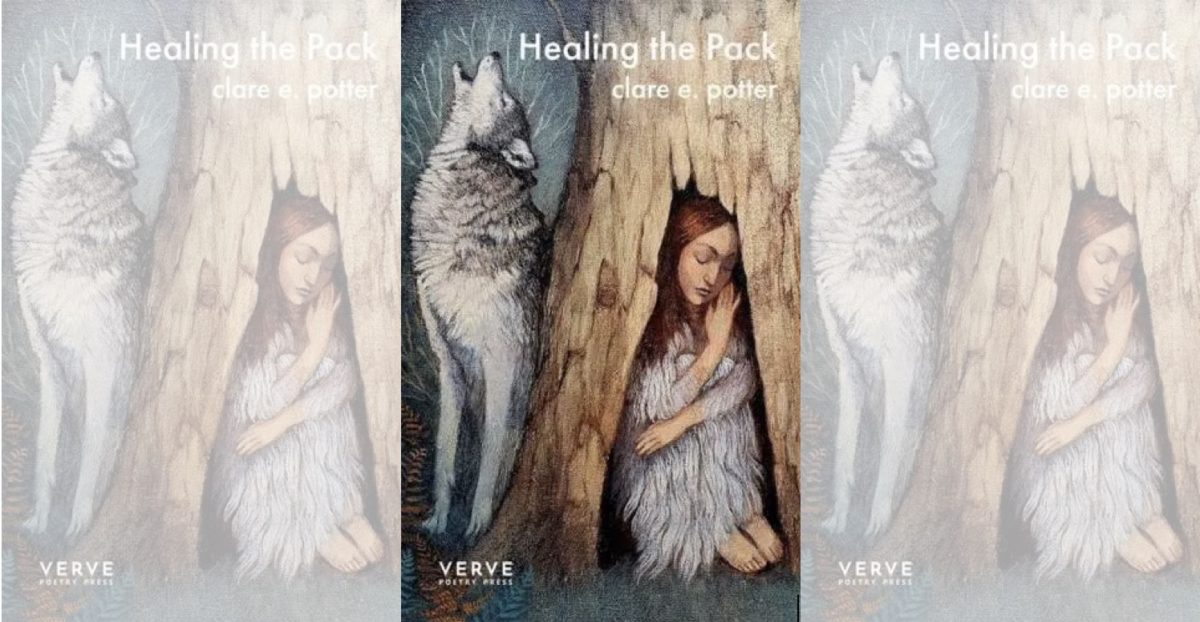Poetry review: Healing the Pack by clare e.potter

Eric Ngalle Charles
What sets clare e. potter’s collection apart is the unique fusion of her voice with the profound wisdom of Khalil Gibran’s The Prophet.
This blend, intricately woven into the fabric of Healing the Pack, offers a fresh and profoundly insightful perspective. The transformative power of literature, particularly poetry, in the face of adversity is a central theme in this collection. Rather than being transformed into a vampire and handed the keys to a blood bank, I was journeying through familiar memories.
The poems in this collection, like following a stranger in your city, town, or village, led me to places I never knew existed tenfold.
They are rich with layers of meaning; I wiped my eyes; in others, I blinked and wished they were a bit longer. Potter’s collection offers solace, weaving in and out of memory lanes, generational love, and inheritance poetry; this collection has it all. If in doubt, I invite you to feast your senses on the poem, “What They Cannot Measure.”
Majestic language
The womb, our first grave, and the umbilical cord, our first walking stick, guide us through the Na Kwa, Na Temeh, life’s initial battles of crawling, standing, and falling. This sentiment is beautifully captured in “Bird Prayer 1: Chick.” The simplicity yet intensity of this piece are genuinely captivating. The familiarity of a teen mother carrying me is made majestic in the beauty of language, Unsheathed talons, —–My mother wiped the blood from her mouth.
The language is truly the stuff of magic. As the peregrine dive-bombed, I, too, wondered the fate of the fat ground bird. Was it a gull?
My enthusiasm for this collection derives both from appreciation and a deep emotional connection. Healing the Pack, published by Verve Poetry Press is not just an anthology of poems but a profoundly personal journey. It’s divided into five sections: Mam, Let’s Not Go On The Path We Know, You’re Gonna Have To Ride That Beast Out, Mam, You Know When We Are Walking, My Daughter’s Fox On The Wall, and Keep Calm, Mam, And Write Poetry.Each section is a testament to her love and respect for her parents, making this collection a truly intimate experience that resonates with the reader profoundly and emotionally.
The poem, “You Will Be Fine after the Funeral” feels like reading Before I Die by the Persian great Jalal al-Din Muhammad Rumi, but it ends with a gut-wrenching punch, “Bone powder of his lies and their last burning.’’ The beauty of seeing and not looking and childhood innocence is captured in the poem Seeing (Better than Looking) on page forty-nine: “Well who are you, you in the glass? I eatened a Magpie and I seen SKY.’’
Looking back, is it when she is doing the dishes and gazing out the windows? Those tiny moments are when we miss those we love, now gone, and all we have are memories.
These emotions are captured in the poem “She Wouldn’t Be able to Come to You So Often If She Were Alive.” In it, Potter invites the reader into a world of creating lasting memories. When the grave closes, the curtains go down, and the mourners disappear. We are left with dreams and memories. Eventually, that, too, fades. The last line reminds me of Ted Hughes’ poem, “The Rabbit Catcher.”
Feast
For those interested in autobiographical writing, feast your senses on “Bedside Photo.” Why did the house go grey after she died? This is a book written and hidden in plain sight. Every line in this poem can be a single stanza and developed into chapters in a novel.
In the poem, “False Witness,” my heart thumped with each word, and I think about where the writer is going with this. “Stop,’’ and my heart did stop. ‘’I’d said I can hear my mother calling, and you can hear her, too!’’ Call it what you want, standing on the ledge, a cliffhanger, but that childhood naivety saves the day. I love this poem a great deal.
Incubating
Mother, father, grandma, the poems in this collection feel like they’ve been incubating for some time. In “Taking It Out” we meet the familiar figure of a grandmother. We love grandmothers, but here, she is armed with an axe. “When my grandmother chopped wood even neighbours went indoors.’’ I gasped reading this. I, too, felt a splinter in my eye.
In the poem “Another Case for Murder” clare potter is at her best in making the mundane into something mesmerising; you read the lines and do a double take. It reminded me of the program on BBC iPlayer called The Young Offenders. “It was a step up when my sister had a child at sixteen. Everyone in my village had a baby at fourteen years of age.’’
The title poem, “Healing the Pack” reads like a subtle waterfall dripping and rain tok-tok tapping on the windowsill. “Hunt down the poet you’ll become/ bite out her tongue,/ teach her what it is to howl.’’
Pollinators
This collection features an abundance of pollinators and nature and is a tribute to nature recyclers. We meet rivers, swarms of bees, trees, fields, buzzards, peregrine falcons, red-tail hawks, Kingfishers, and hummingbirds within the shimmering sunshine. And if you read and listen carefully, you will hear the caged bird singing, calling us to join the pack and heal in unison.
I leave you with my favourite line. “Sometimes we don’t mean/ to strike,/ but we hurt/ and there’s nothing we can do/ to take it back.’’
Diolch yn fawr clare e. potter for a bendigedig collection.
Healing the Pack by clare e.potter is published by Verve Poetry Press. It is available from all good bookshops.
Support our Nation today
For the price of a cup of coffee a month you can help us create an independent, not-for-profit, national news service for the people of Wales, by the people of Wales.




